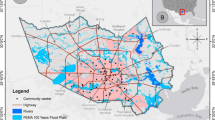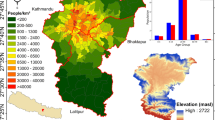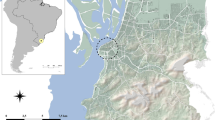Abstract
Previous studies have linked poor mental human health with environmental degradation, but none have assessed additional diseases that may co-exist with these mental disorders. In previous work, depression was found to be associated with a major form of environmental degradation; dryland salinity. However, little is known about diseases co-morbid with depression in this environmental setting. In rural Australia, dryland salinity is a major form of environmental degradation contributing widely to deterioration and non-viability of farmland. Using georeferenced health record data, Bayesian spatial methods were used to determine the relationship between dryland salinity and a range of human health outcomes. Initial modelling found an increased relative risk for asthma, suicide and ischaemic heart disease in relation to dryland salinity (adjusted for Indigenous and socio-economic status). However, in this follow-up study, a further evaluation of the role of co-morbidities in this population revealed that: (i) the presence of depression was consistently linked to residence in areas with high salinity and (ii) the association of asthma, suicide and heart disease with salinity was most likely attributable to the co-morbidity of the conditions with depression. Given the predicted increase in dryland salinity and the elevated relative risk of depression in impacted areas, the relative risk of the co-morbid conditions can be expected to increase in rural areas in the future, further adding to the burden of disease associated with environmental degradation.




Similar content being viewed by others
References
Aina Y, and Susman JL (2006). Understanding comorbidity with depression and anxiety disorders. Journal of the American Osteopathic Association 106:S9-14.
Anda R, Williamson D, Jones D, Macera C, Eaker E, Glassman A, et al. (1993). Depressed affect, hopelessness, and the risk of ischemic heart disease in a cohort of U.S. adults. Epidemiology 4:281-283.
Besag J, York J, and Mollie A (1991). Bayesian image restoration with two applications in spatial statistics. Annals of the Institute of Statistical Mathematics 43:1-59.
Bruce EC, and Musselman DL (2005). Depression, alterations in platelet function, and ischemic heart disease. Psychosomatic Medicine 61:S34-S36.
Bunker SJ, Colquhoun DM, Esler MD, Hickie IB, Hunt D, Jelinek VM, et al. (2003). “Stress” and coronary heart disease: psychosocial risk factors. Medical Journal of Australia 178:272-276.
Cochrane GM (1996). Compliance and outcomes in patients with asthma. Drugs 52:12-19.
Crighton EJ, Elliott SJ, van der Meer J, Small I, and Upshur R (2003). Impacts of an environmental disaster on psychosocial health and well-being in Karakalpakstan. Social Science & Medicine 56:551-567.
Eisner MD, Katz PP, Lactao G, and Iribarren C (2005). Impact of depressive symptoms on adult asthma outcomes. Annals of Allergy Asthma & Immunology 94:566-574.
Goldney RD, Ruffin R, Fisher LJ, and Wislon DH (2003). Asthma symptoms associated with depression and lower quality of life:a population survey. Medical Journal of Australia 178:437-441.
Hippisley-Cox J, Fielding K, and Pringle M (1998). Depression is a risk factor for ischemic heart disease in men. British Medical Journal 316:1714-1719.
Jiang W, and Davidson JR (2005). Antidepressant therapy in patients with ischemic heart disease. American Heart Journal 150:871-881.
Jiang W, Babyak MA, Rozanski A, Sherwood A, O’Connor CM, Waugh RA, et al. (2003). Depression and increased myocardial ischemic activity in patients with ischemic heart disease. American Heart Journal 146:55-61.
Jiang W, Glassman A, Krishnan R, O’Connor CM, and Califf RM (2005). Depression and ischemic heart disease: What have we learned so far and what must we do in the future? American Heart Journal 150:54-78.
Judd F, Cooper A-M, Fraser C, and Davis J (2006). Rural suicide-people or place effects? Australian and New Zealand Journal of Psychiatry 40:208-216.
Katon WJ, Richardson L, Lozano P, and McCauley E (2004). The relationship of asthma and anxiety disorders. Psychosomatic Medicine 66:349-355.
Kennedy N, and Foy K (2005). The impact of residual symptoms on outcome of major depression. Current Psychiatry Reports 7:441-446.
Kolbe J, Fergusson W, Vamos M, and Garrett J (2002). Case-control study of severe life threatening asthma (SLTA) in adults: psychological factors. Thorax 57:317-322.
Lawson AB, Biggeri AB, Boehning D, Lesaffre E, Viel J-F, Clark A, et al. (2000). Disease mapping models: an empirical evaluation. Statistics In Medicine 19:2217-2241.
Lawson AB, Browne WJ, and Vidal Rodeiro CL (2003). Disease mapping with WinBUGS and MLwinN. Wiley, Chichester, England.
Moiseenko TI, Voinov AA, Megorsky VV, Gashkina NA, Kudriavtseva LP, Vandish OI, et al. (2006). Ecosystem and human health assessment to define environmental management strategies: The case of long-term human impacts on an Arctic lake. Science of the Total Environment 369:1-20.
Moussavi S, Chatterji S, Verdes E, Tandon A, Patel V, and Ustun B (2007). Depression, chronic diseases, and decrements in health: results from the World Health Surveys. Lancet 370:851-858.
NLWRA (2001). Dryland salinity in Australia. A summary of the National Land and Water Resources Audits. National Land and Water Resources Audit, Canberra, ACT.
Norris DE (2004). Mosquito-borne diseases as a consequence of land use change. EcoHealth 1:19-24.
Opolski M, Wilson I (2005) Asthma and depression: a pragmatic review of the literature and recommendations for future research. Clinical Practice & Epidemiology in Mental Health 1:18.
Oquendo MA, Bongiovi-Garcia ME, Galfalvy H, Goldberg PH, Grunebaum MF, Burke AK, et al. (2007). Sex differences in clinical predictors of suicidal acts after major depression: a prospective study. American Journal of Psychiatry 164:134-141.
Ostfeld RS, and Keesing F (2000). The function of biodiversity in the ecology of vector-borne zoonotic diseases. Canadian Journal of Zoology 78:2061-2078.
Ostfeld RS, and LoGiudice K (2003). Community disassembly, biodiversity loss, and the erosion of an ecosystem service. Ecology 84:1421-1427.
Pennix BWJH, Guralnik JM, Medes de Leon CF, Pahor M, Visser M, Corti M-C, et al. (1998). Cardiovascular events and mortality in newly and chronically depressed persons >70 years of age. American Journal of Cardiology 81:988-994.
Pink B (2008). An introduction to Socio-Economic Index For Areas (SEIFA). Canberra, ACT, Australia.
Rozanski A, Blumenthal JA, and Kaplan J (1999). Impact of psychological factors on the pathenogenesis of cariovascular disease and implications for therapy. Circulation 99:2192-2217.
Serafino S, Somerford P, and Codde J (2000). Hospitalisation as a consequence of deliberate self-harm in Western Australia, 1981–1998. Health Department of Western Australia., Perth.
Smith A, Krishnan JA, Bilderback A, Riekert KA, Rand CS, and Bartlett SJ (2006). Depressive symptoms and adherence to asthma therapy after hospital discharge. Chest 130:1034-1038.
Speldewinde PC, Cook A, Davies P, Weinstein P (2009). A relationship between environmental degradation and mental health in rural Western Australia. Health & Place 15: 880-887.
Spiegelhalter DJ, Best NG, Carlin BP, and van der Linde A (2002). Bayesian measures of model complexity and fit. Journal of the Royal Statistical Society Series B 64:583-639.
Stamatakis KA, Lynch J, Everson SA, Raghunathan T, Salonen JT, and Kaplan GA (2004). Self-esteem and mortality: prospective evidence from a population-based study. Annals of Epidemiology 14:58-65.
Temel T (2004). Malaria from the gap: need for cross-sector co-operation in Azerbaijan. Acta Tropica 89:249-259.
Van Haaften EH, and Van de Vijver FJR (1996a). Psychological consequences of environmental degradation. Journal of Health Psychology 1:411-429.
Van Haaften EH, and Van de Vijver FJR (1996b). Psychological stress and marginalization as indicators of human carrying capacity in deforesting areas. International Journal of Sustainable Development World Ecology 3:32-42.
Van Haaften EH, and Van de Vijver FJR (1999). Dealing with extreme environmental degradation: stress and marginalization of Sahel dwellers. Social Psychiatry and Psychiatric Epidemiology 34:376-382.
Van Haaften EH, and Van de Vijver FJR (2003). Human resilience and environmental degradation: The eco-cultural link in the Sahel. International Journal of Sustainable Development World Ecology 10:85-89.
Van Haaften EH, Yu ZR, and van de Vijver FJR (2004). Human resilience in a degrading environment: a case study in China. Asian Journal of Social Psychology 7:205-219.
Wheatley D (1994). Medical implications of stress. in J. Rose, editor. Human Stress and the Environment. Gordon and Breach Science Publishers, Yverdon, Switzerland.
Wong MD, Chung AK, Boscardin WJ, Li M, Hsieh HJ, Ettner SL, et al. (2006). The contribution of specific causes of death to sex differences in mortality. Public Health Reports 121:746-754.
Wright RJ (2005). Stress and atopic disorders. Journal of Allergy and Clinical Immunology 116:1301-1306.
Acknowledgments
This research was funded by the Cooperative Research Centre for the Plant Based Management of Dryland Salinity. The research was approved by the University of Western Australia’s ethics committee (RA/4/3/0492).
Author information
Authors and Affiliations
Corresponding author
Rights and permissions
About this article
Cite this article
Speldewinde, P.C., Cook, A., Davies, P. et al. The Hidden Health Burden of Environmental Degradation: Disease Comorbidities and Dryland Salinity. EcoHealth 8, 82–92 (2011). https://doi.org/10.1007/s10393-011-0686-x
Received:
Revised:
Accepted:
Published:
Issue Date:
DOI: https://doi.org/10.1007/s10393-011-0686-x




